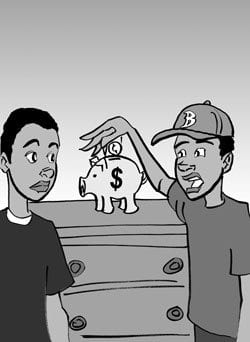
A dream denied
A major aspect of the American Dream has been damaged in the current recession. Many parents endure the difficulties of their lives in the belief that greater opportunities will be available to their children. However, the Pew Research Center study of June 30 entitled “The Great Recession at 30 Months” indicates that this dream has faded.
According to the study, only 45 percent of adults believe that their children will have a better standard of living when they reach their parents’ present age. And what is worse, 26 percent now believe that their children will be worse off. This is a positive/negative gap of only 29 percent. While there has been some erosion over the years in the optimism about future economic opportunity, the gap in 2002 was 51 percent, according to the report. Present attitudes represent quite an erosion.
Loving parents have a great concern for the welfare of their families and the future opportunities for their children. The destruction of this dream could create a serious rip in the social fabric. Policy makers are well advised to understand the causes of this negativity and develop remedies.
Undoubtedly, parents’ attitudes about the prospects for their children can be influenced by a number of variables. The U.S. has endured 13 recessions since the Great Depression of 1929, and there will undoubtedly be others in the future. However, it would be speculative to assume that the present economic recession is the only cause for parental concern.
There has been a substantial economic shift in the United States over the last 30 to 40 years. The Organization for Economic Cooperation and Development claims that the U.S. has the greatest inequality in the distribution of wealth and income of any industrialized nation. This disparity has come at the expense of the middle class.
It has become increasingly more expensive to enjoy a middle class standard of living but wages have not kept pace. Up until 1973 wages were continually rising, but then they began to level off. According to Federal Reserve data, between 1982 and 1994 the productivity of labor increased at three times the rate of hourly wages. Yet the real income of high school graduates dropped by 21 percent between 1979 and 1990.
The increase in the productivity of labor seems to have benefitted only the well-to-do. Reported income in the U.S. increased by almost 9 percent in 2005, but the average income of those in the bottom 90 percent dropped slightly from 2004. However, those in the top 10 percent, which includes those earning $100,000 or more per year, attained a greater share of the income than the levels reached before the Great Depression.
The top 1 percent, those with incomes of more than $348,000, received 21.8 percent of all reported income in 2005. This is more than half (55 percent) of the 48.5 percent of the total income earned by the top 10 percent and it is more than twice their share of the top 1 percent in 1980.
Regardless of their income level, no one is happy about paying taxes. Indeed, there is nothing illegal or even immoral for the wealthy to organize their finances to minimize taxes. However, it is contrary to the public interest to reduce tax rates on the wealthy so severely that there are insufficient resources to finance public education and needed safety net programs.
The costs of housing, medical care, college tuition, transportation and household expenditures have risen precipitously, while wages have been stagnant. For many, the middle class lifestyle is now out of reach. How will the stifling of the American Dream affect the attitudes of working class Americans? This should be a matter of serious concern.






